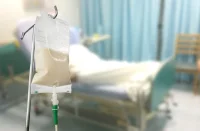ICU patients are often too ill to make decisions for themselves and need family members or surrogates to make medical decisions on their behalf. Surrogates may have to use substituted judgment when the critically ill patient has left no advanced directives. In such a situation, the surrogate may have to make decisions by considering what the patient would have done in a similar situation. This can cause uncertainty and distress among families as these decisions can often be difficult. That is why symptoms like anxiety, depression, and stress are common among families of ICU patients. The emotional well-being of the family member or surrogate can affect their understanding of the patient’s condition and impact their comfort when making certain medical decisions.
A trial was conducted to determine the effect of daily written updates on the satisfaction and psychological symptoms of families of ICU patients. The study included surrogates of 252 critically ill adults with a high risk of mortality. The primary interventions evaluated in the study were usual communication with critical care teams with or without written communication clearly outlining the cause and management approach used in these patients daily.
All participants completed surveys at three time points during the ICU stay: at the time of enrolment, and one week, and two weeks after enrolment. The Critical Care Family Needs Inventory (CCFNI) was used to measure satisfaction with care. In addition, the Hospital Anxiety and Depression Scale (HADS) and Impact of Events Scale Revised (IES-R) were used to assess the presence of anxiety, depression, and acute stress.
All three scores were similar among participants assigned to the intervention group and the control group upon enrolment and during the first week after enrolment. However, from the time of enrolment to the second week after, there was an improvement in CCFNI and HADS scores among participants assigned to the intervention group versus the control group. At week 2, CCFNI scores were significantly lower among participants in the intervention group versus the control group. This suggests that this group was more satisfied with care. The odds of symptoms of anxiety, depression, and acute stress among participants assigned to the intervention versus the control group were 0.16, 0.15, and 0.27, respectively, after two weeks.
These findings suggest that written communication can improve the satisfaction and emotional well-being of families of critically ill patients and can be used as a supplement to traditional communication approaches.
Source: Critical Care Medicine
Image Credit: iStock
References:
Greenberg JA, Basapur S, Quinn TV et al. (2022) Daily Written Care Summaries for Families of Critically Ill Patients: A Randomized Controlled Trial. Critical Care Medicine: 50(9):1296-1305. doi: 10.1097/CCM.0000000000005583
Latest Articles
critically ill patients, ICU diaries, daily written diaries, ICU families
Effect of Daily Written Updates for Families of ICU Patients










